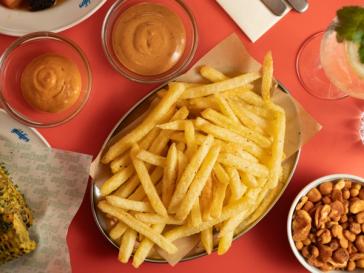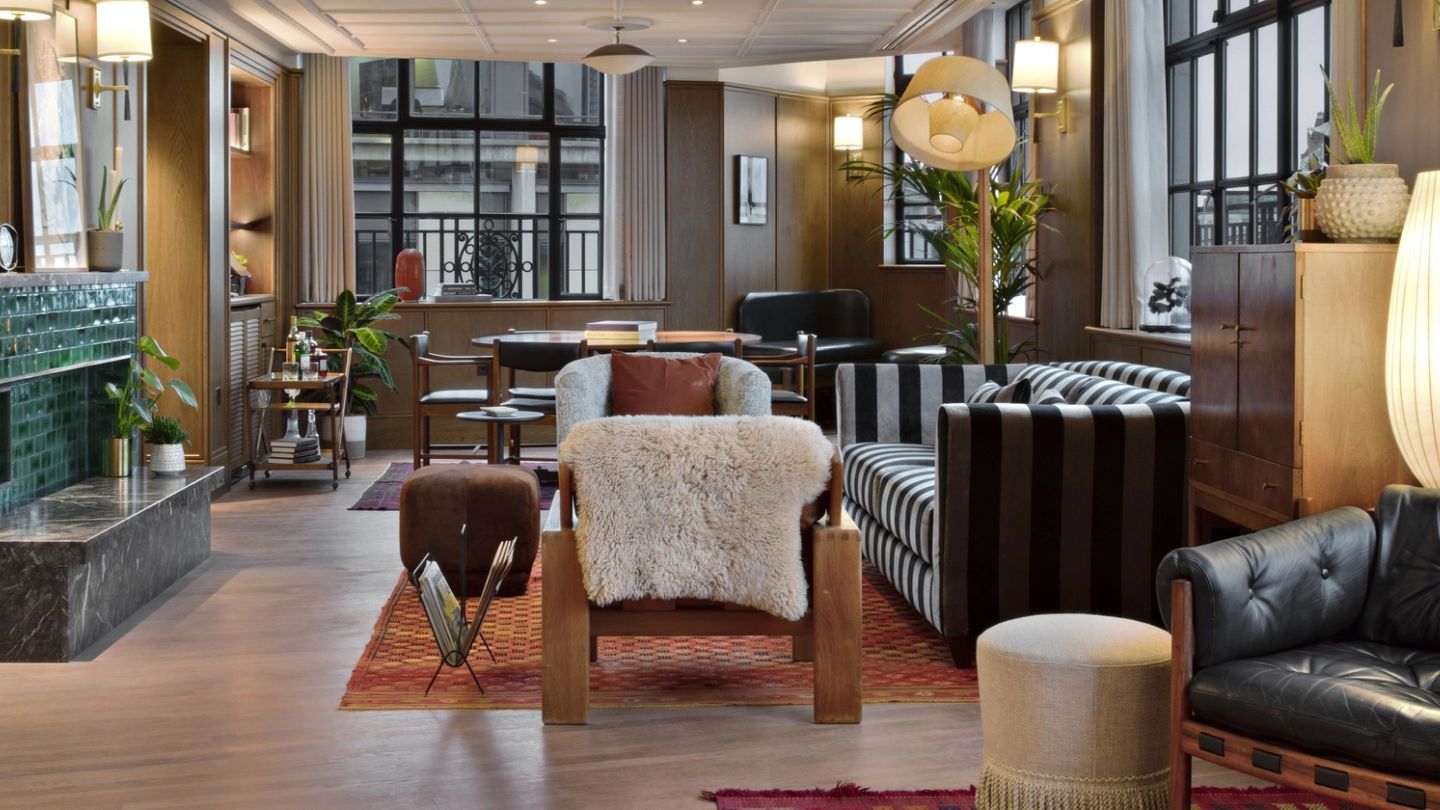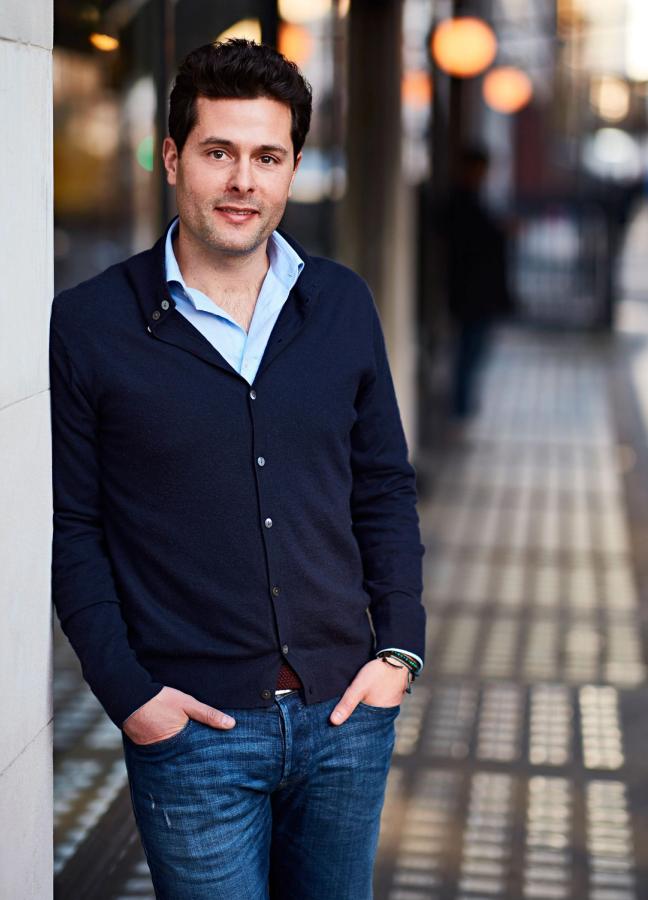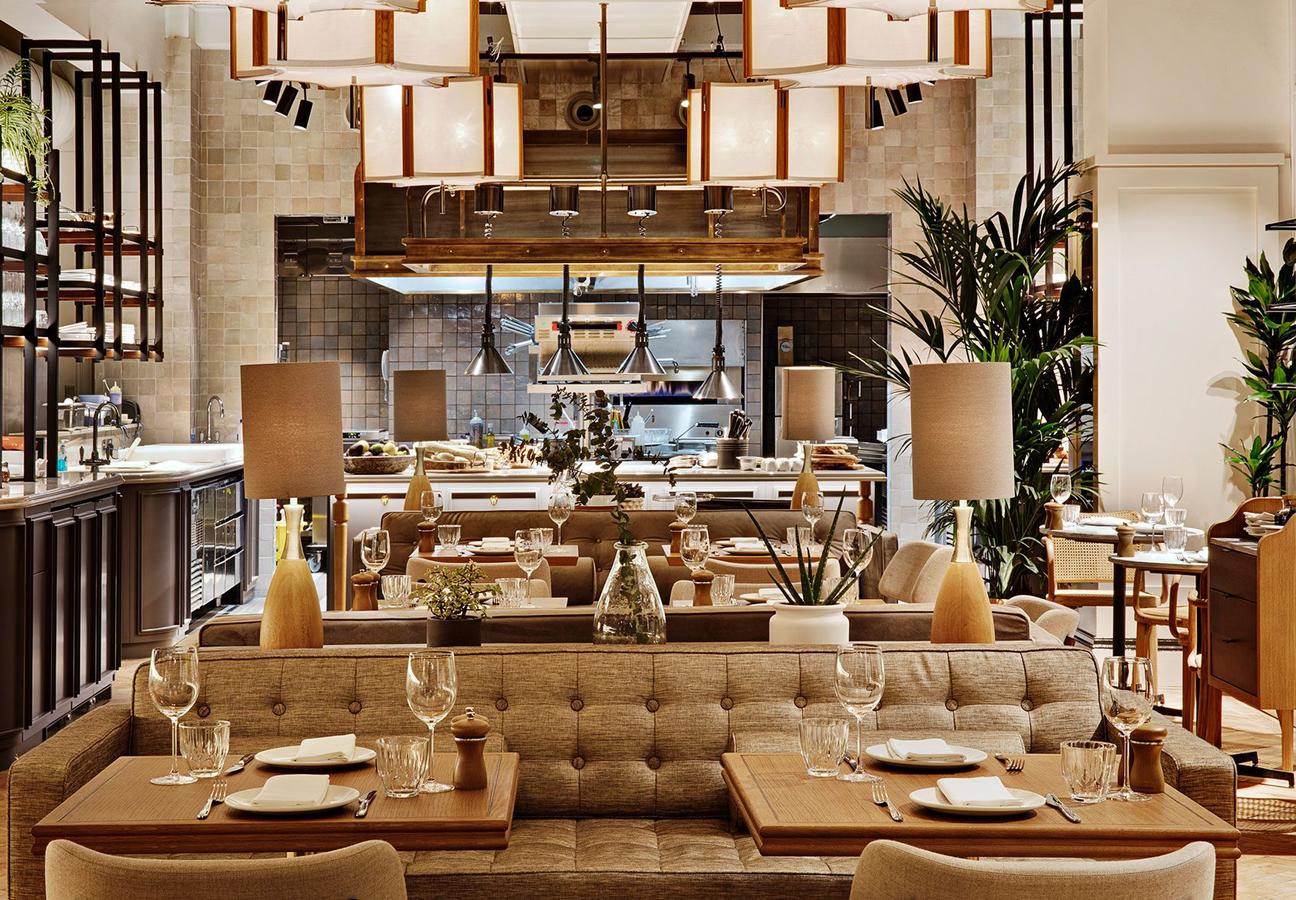

Is this what the future of offices looks like?
We visited Mortimer House in Fitzrovia, the work and wellbeing destination that wants you to swap work/life balance for self-actualisation...
Words: Ally Sinyard
Take a walk through London’s Fitzrovia and, on the corner of Wells and Mortimer Street, stands a beautiful, 1930s Art Deco building. Step inside and you’ll find Mortimer House Kitchen, already regarded as one of the hottest new brunch spots in Central London, thanks to its excellent Mediterranean menu and inviting, light and airy interiors.
But there’s more to Mortimer House than a great shakshuka. Six more stories, in fact. Explore the floors and you’ll find a fully equipped gym, a meditation room, a bar area and a balcony dotted with hammocks. And that’s before we’ve mentioned the floors full of private offices, boardrooms, open-plan workspaces and even a meeting room that comes with a dedicated chef.
So what is Mortimer House, exactly – a new residential development? A hotel? It very well could be, except for, well, the lack of bedrooms. But the inability to stay the night is probably a good thing, otherwise you might be inclined to take up permanent residence.
But it’s neither a residency nor another private members club nor simply a co-working space. It’s a very satisfying sweet spot between the two, perhaps most simply described as a destination for work and wellbeing.
Mortimer House wants to shake off the idea that these two things are mutually exclusive, and the man grabbing us firmly by the shoulders is founder Guy Ivesha, who opened the doors in November 2017.

Guy Ivesha
“I stopped using the term work/life ‘balance’ when I realised it’s not about balance, it’s about harmony,” he tells us, with a warm handshake and cappuccino (no literal shoulder-shaking) when we paid a recent visit to Mortimer House.
“Harmonising everything is what we’re trying to do here – bringing these worlds together and being so passionate about what you do that it becomes indistinguishable from other elements in your life.”
Ivesha first got the idea for Mortimer House when he began to notice a shift in working culture. More and more of us were trading in the 9-to-5 for more flexible ways of working. And this wasn’t just limited to when we were working; the “where” was changing too…
“I saw the first edition of these co-working spaces popping up, and I always felt that, with hospitality, they could be better,” he tells us. “I wanted to create something for people who are now used to this new form of working, but are seeking more from that community. They want to satisfy not just their professional objectives, but their personal ones as well.”
You won’t be surprised to read that Ivesha literally grew up in hospitality. The son of a hotelier, Ivesha studied hospitality and finance at university before moving to New York to work on the redevelopment of The Plaza Hotel.
He returned to London to work with his father Boris, CEO of PPHE hotel group, before venturing out on his own to found his own company, Maslow’s.
Mortimer House is Maslow’s first project. The name comes from Abraham Maslow, the American humanist psychologist famed for his Hierarchy of Needs. Maslow believed that all humans have a desire towards self-actualisation (i.e. the motivation to realise one’s full potential) and that all human needs can be arranged into a hierarchy.
Often represented as a pyramid, this hierarchy puts the most basic needs (such as food, water and sleep) at the bottom, and the ultimate goal of self-actualisation at the top. In order to progress up the pyramid, one must satisfy the most basic needs first, in order to give the more complex ones their full attention.

You can see this philosophy reflected not just in the ethos of Mortimer House, but also in its layout. It’s hardly a coincidence that the restaurant and gym are located on the ground and lower floors, both fully equipped to satisfy those physiological needs of ours.
Move up the building and you’ll find four floors of work studies, where single members to entire teams of 25 can work in private or even say goodbye to hot-desking and take out a permanent space.
If you prefer to work a little more collaboratively, or simply want a break after a few hours of emails, you can take the lift to the more lively and sociable fifth floor. It’s certainly very inviting, with its modern and vintage furniture, mid-century library, fireplaces and central bar.
Go up one more storey and you’ll find Mortimer House’s penthouse-style Loft & Gallery space, “where you get inspiration and collaboration.” Mortimer House hosts all manner of events here, from private film screenings and functions to workshops and weekend brunches, complete with a DJ on the decks.
Bottom to top, Ivesha imagines a typical day at Mortimer House like a literal climbing of that same hierarchy, from your morning workout and Avocado Royale to evening drinks on the Loft & Gallery’s outdoor balcony. But more importantly, having this variety of work and wellbeing spaces means that everybody is catered for.
“A single individual could change the way they work on any given day, or time of day,” says Ivesha. “They might go to the fourth floor for a quiet work environment without distraction, then after a couple of hours, when they’ve finished their emails and phone calls, they can come up to the fifth to continue to work, but with a bit more interaction with others.”
To Ivesha, creating this sense of community in Mortimer House is as important as any state-of-the-art facilities. “The only thing that creates real happiness is a sense of belonging and community and relationships,” he says. “So far I think we’ve been very successful in providing an environment that allows us to have that.
“There used to be a time, not too long ago, when people said you can work from everywhere because of technology. You can take your laptop to any coffee shop, you can work from home – it was a big thing back then.
But then, very quickly, everybody realised that most people don’t want to work from home or from coffee shops in solitude. They want to go somewhere where they can talk about what they’ve done on the weekend, their sports team and hobbies. They want to have that sense of community that we all long for.”
Saving people from the isolation that technological advances can bring wasn’t the only war Ivesha wanted to wage on the digital world. He also wanted to get rid of the sight of it! He describes himself as “allergic” to the sight of technology and, together with New York architects AvroKO, went about designing a space where “only the analogue is visible.”
“I don’t like seeing screens everywhere, like you’ll see with some of my peers,” he says. “It’s there and it’s available for you, but you have to look for it.
I wanted to create something that feels like it’s been here a long time, not something too polished or pretentious. We’re in Fitzrovia, after all. It has a bohemian history, and I wanted to honour that history.”
Ivesha’s love for the area and its history also prompted his decision to open Mortimer House Kitchen to the public.
“In a lot of the private members clubs, the restaurants are only there to serve their members,” he tells us. “I felt in a location like Fitzrovia, with this beautiful Art Deco 1930s building, it would be a crime not to allow the public to come in here and experience at least some part of what we have to offer.”
So is this what the future of offices looks like? Will we all eventually swap the traditional office space for co-working environments?
“I think the term co-working is overused,” says Ivesha. “But I do believe more and more people will work in a fashion that allows them to be flexible. I think the whole concept of ownership will gradually disappear from the world. Ownership of the house, ownership of the car, owning your own office. There’s no question that this is how people want to work.
“People are realising they feel much lighter, mentally and physically, if they don’t own things. If you don’t own a car, you can use various apps to use one; co-living encourages people not to own and rent. Even the content you watch – you no longer buy movies, you stream them and it’s a subscription-based model. Almost every aspect of how we live will become a subscription-based model. In many ways, Mortimer House is one too.”
Mortimer House offers a selection of membership tiers so, if you’re tempted to break free from your office, take a look at what’s available. Or, at the very least, satisfy your physiological needs very well indeed with a meal at Mortimer House Kitchen.


